
Unveiling the AI Beauty Standard: How ChatGPT is Changing Self-Perception
In a world where social media influences perceptions of beauty and self-worth, individuals are turning to artificial intelligence for validation. The recent trend of asking ChatGPT if they are ‘hot or not’ raises vital questions about our self-esteem, expectations, and the role of technology in shaping our identities. Young professionals and students, especially, are navigating these waters, looking for reassurance in a fast-paced environment.
The Intersection of AI and Beauty Standards
The concept of beauty is subjective, but societal standards often dictate how individuals perceive themselves. With ChatGPT stepping in as an impartial judge, users hope to obtain honest feedback while avoiding potential biases that come from friends or peers. By seeking answers from AI, people are exploring a new frontier of self-evaluation, where thoughts and feelings converge with technology. But at what cost?
Understanding the Rise of AI Self-Assessment Tools
As interest in artificial intelligence grows, so do its applications in everyday life. AI tools are now integral in various sectors—ranging from marketing to health care. With AI understood simply through user-friendly platforms, newcomers can gain insights and access complicated algorithms that inform such beauty standards. This evolution makes technology accessible, promoting not just a deeper understanding of AI but also practical insights on how these systems operate.
Emotion and AI: Striking a Balance
There is a genuine emotional journey involved when people confront the perceived judgments of an AI tool concerning their appearance. ChatGPT offers a straightforward approach, but this can lead to a double-edged sword. On one hand, it provides individuals with the chance to explore their identities away from the human gaze. On the other hand, reliance on AI for self-esteem could create unhealthy benchmarks based merely on subjective computations.
Beyond the Surface: Discussing AI Ethics
This trend invites a broader discourse around AI ethics. Is it ethical to let algorithms contribute to self-image? The challenge lies in teaching users the limitations of AI while understanding its vast capabilities. Leveraging AI for personal development must come with a responsible framework. Educating the public on the basics of AI programming and its practical applications can ensure that individuals are not unwittingly imparting excessive weight to digital advice.
Future Implications: Will AI Shape Our Concepts of Beauty?
Additional discourse should raise curiosity about how AI will continue to impact perceptions of beauty and self-worth. With tools being developed for more accurate representation and analysis, can we foresee a future where AI-induced confidence overshadows organic self-esteem? The integration of social media and AI asks us to think critically about where validation comes from in a digital society.
As technology evolves, starting with artificial intelligence basics through accessible, simple concepts, tools like ChatGPT can either bolster or challenge our perceptions of beauty. Understanding that these tools are interpretations, not truths, can allow individuals to harness AI as an empowering force rather than a dictatorial one.
In this new era of self-exploration, recognizing AI’s role in shaping social standards is critical. To adapt and thrive, we must remain vigilant and prioritizing our emotional health over technology's cold assessments.
 Add Row
Add Row  Add
Add 




 Add Row
Add Row  Add
Add 



Write A Comment